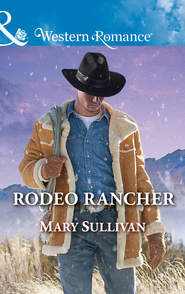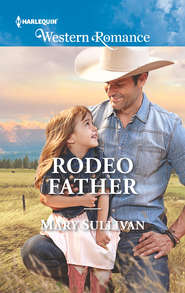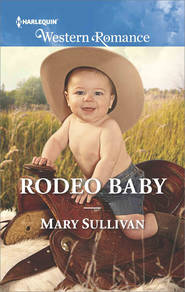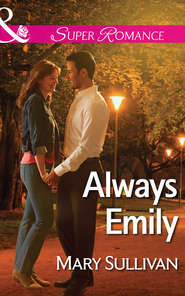По всем вопросам обращайтесь на: info@litportal.ru
(©) 2003-2024.
✖
A Cowboy's Plan
Автор
Год написания книги
2019
Настройки чтения
Размер шрифта
Высота строк
Поля
“I’m C. J. Wright. I own this place,” he said, his voice almost as rich as the chocolate she smelled melting in a pot somewhere. “Can I help you?”
C.J. HAD SEEN this woman before, when she’d stood in his store with Amy Shelter, when Amy had returned from Billings to marry Hank.
C.J.’s memory hadn’t exaggerated. She looked like a punker. Or a Goth woman.
That day the young woman with Amy had looked real sad—like she’d been crying day and night for weeks.
She didn’t look sad today, though. She looked tough and determined.
The unrelenting black of her dress echoed the big platform boots, the black lipstick and nail polish, and the half inch of mascara coating her lashes. Looked like she’d applied it with a trowel.
Her plain dress, black cotton hemmed at the knee, should have been conservative, but it hugged every curve like it was made of burned butter and hit him like a sucker punch to the gut. He’d never seen anything like her in Ordinary. With her piercings and the tiny tattoo on the inside of her left elbow, she looked too much like Vicki for comfort.
Damn.
In her defiant stance, one hip shot forward and one black-nailed hand resting on it, her head cocked to one side, tough and cynical, he saw himself as a teenager. She was no longer an adolescent, but not by much.
No way did he want her here reminding him of his younger days, of times and troubles best buried.
He threw down the towel he’d dried his hands with. He had his life under control. He’d sown all of the wild oats he ever intended to. These days he had the best reason on earth to behave well.
Something about her tough beauty called to him, but he resisted. God, how he resisted.
She wasn’t beautiful. She was trouble.
Pure, cleansing anger rushed through him—anger at himself. The days when he found a woman like this attractive were long gone. He hadn’t spent the past year reinventing himself to be drawn back into the wildness a woman like this inspired in him.
Get your shit together, buddy.
With an effort that left him shaking, he pulled himself under control.
“Can I help you?” he asked, cordially, as if she was any other customer.
She pointed out the window and said, “I want that.”
He looked out to see BizzyBelle wandering down the middle of the road. Nuts, she’d gotten out of her pen around back, again. Bizzy had to be the wiliest cow in Montana.
He turned to the woman on the other side of the counter. She still pointed out the window.
“You want my cow?” he asked. Wow, crazy.
“Your cow?” She turned a stunned face toward the window, saw Bizzy and blinked. “No, not the cow. That.”
His gaze shifted to the two bright green papers in his window and his hope soared.
“You want to buy my store?” he asked. “Really?” In four months, he hadn’t had one single nibble and time was running out.
“No,” she said. “I want the job.”
“Oh, I see.” The job. No. No, he didn’t want her here every day. Just his luck, he needed an employee and the only candidate was this Goth creature who would probably scare most of his customers away. Nuts.
“What are your qualifications?” he asked.
She shrugged, as if she didn’t care whether or not she got the job. “I can count money. I can put stuff in a bag.” She’d obviously never gone job-hunting before. She showed neither deference nor humility, nor, come to think of it, any eagerness to please.
“That’s it?” Nervy chick, coming in here with no experience.
“I’ve been working on Hank Shelter’s ranch for a year. He’ll tell you I’m a hard worker.”
She flicked her hair over her shoulder. Maybe he could get her to leave if he appealed to her vanity.
“You’d have to wear a hairnet to cover all of that.” Her shiny hair ran over her shoulders like blackstrap molasses and disappeared down her back.
How long was it? To her waist?
“Whatever,” she said.
Whatever? Rotten attitude for a job candidate.
“You want the job or not?” he asked, impatient now.
“Yeah,” she said, thinning her plump lips. “I want the job. I just told you that.”
He frowned. “You don’t sound like you want it. You’re making it real easy for me to say no.”
Panic washed over her face, quickly hidden. “I want the job. Okay?”
“You’d have to cut your nails. You can’t knead candy with those.”
Her eyes widened. “I’d be making candies?”
“Yeah, what did you think you’d be doing?”
“Selling them. You make them here?” She was suddenly pretty excited. Over making candy?
He nodded. “A lot of them.”
“Can I see where you do it?” she asked.
“Okay.” He directed her to the doorway to the back room. “I can’t let you back there without an apron and a hairnet and heavy shoes, but you can look from here.”
She glanced down at her boots and back up at him. A smile hovered at the corners of her mouth. “These aren’t heavy enough?” Her smile turned that upper lip into a pretty cupid’s bow framed by a heart-shaped jaw. Too attractive.
He reined himself in. “Those’re okay.” He sounded more like a peevish child than a twenty-six-year-old businessman.
With a puzzled frown, she turned away from him and studied the back room and the big machines that filled it, silent sentinels in a gray concrete-block room. He’d grown up with this and had no idea how a stranger would see it.
Nodding toward the machines, she asked, “You’ll teach me how to use those?”











